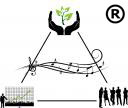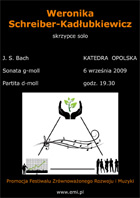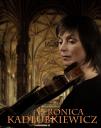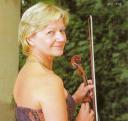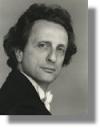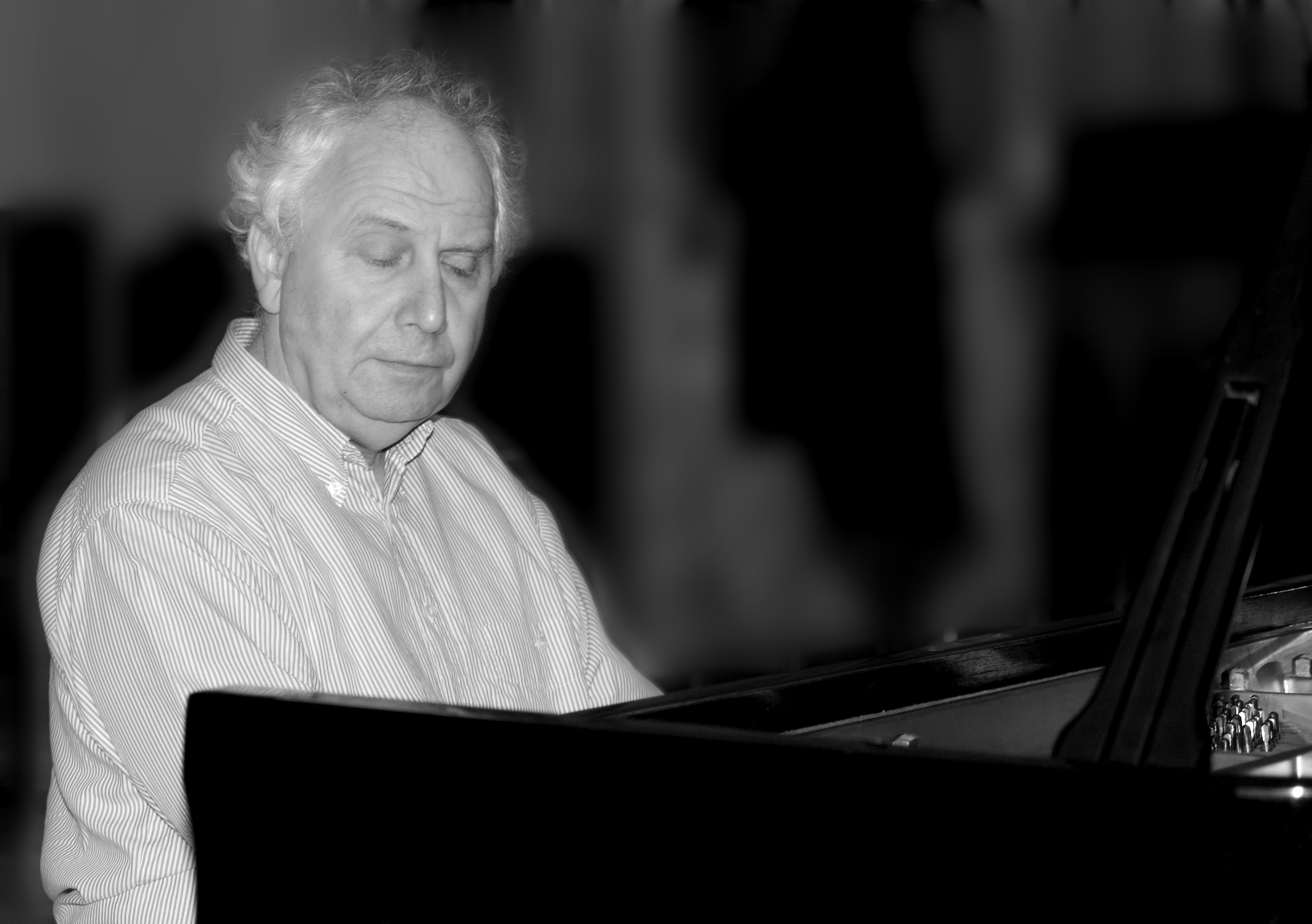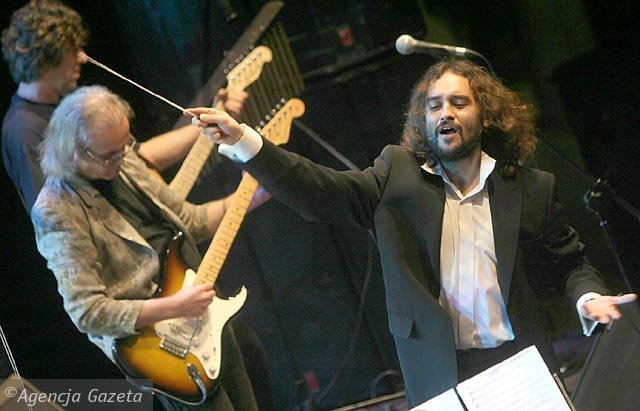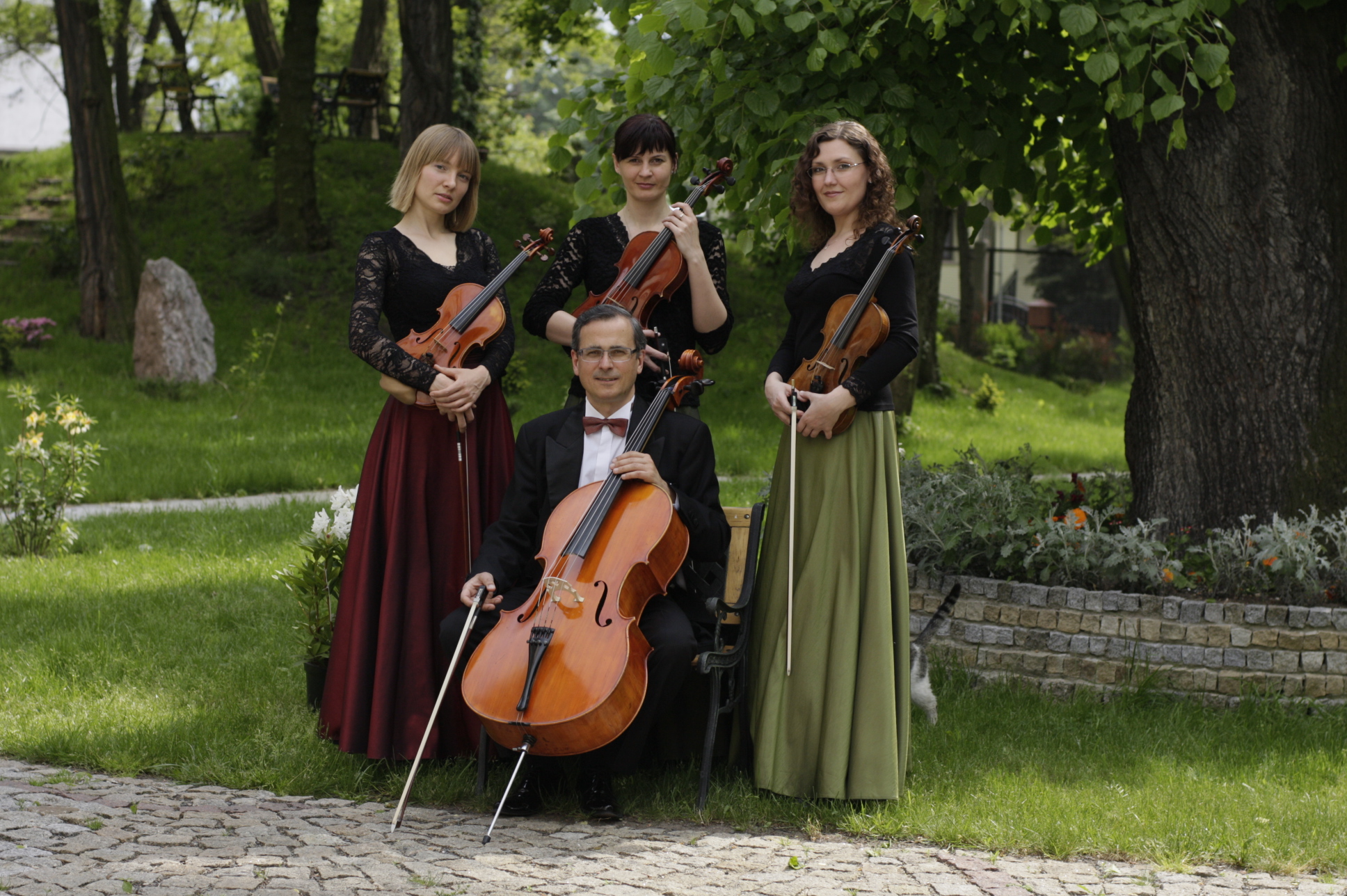Archiwum z miesiąca: July, 2007
The Opole String Quartet Quodlibet was formed by graduates of the Academies of Music in Wroclaw and Katowice, musicians from the Józef Elsner State Philharmonic Orchestra in Opole.
Members of the quartet:
Jacek Adamaszek – violin,
Barbara Zwolińska-Kobiela – violin,
Łucja Butor – cello,
Dariusz Stark – viola.
The group has a very wide and varied repertoire. It plays great compositions of classical and light music, including very popular pieces. Since its beginning, it has successfully contributed to many significant and important events for Opole city and the whole Opole region.
Ms. Dorota Simonides, Senator of the Republic of Poland, Prof., PhD, expressed her appreciation: “Whenever I listen to you, each time I enter the magic world of music. It is not only the occasion to calm myself down and a means of escape from hurry-scurries, but it allows me to transfer to a dimension of harmony and beauty, where I restore my strength and revive my spirit for further action. Except my gratitude and wishes of further successes.”
Kategoria: Quodlibet | Komentarze wył. »
Class Jam-Quartet merges the beauty of classical music with jazz. Its goal from its conception was to combine everlasting achievements of the past with modern times. Chopin once said: “Bach resembles an astronomer to me – some people seem to notice nothing more but complex algorithms in him, but others, who can feel and understand him, are led by Bach to his huge telescope through which he allows them to admire the stars of his masterpieces. If any generation turns it back on Bach, it will give a sad witness of its shallowness, foolishness and bad taste.”
They start each concert with Bach. Jazz adaptations of classical works are written for the group by Michał Wróblewski.
Members of the quartet:
Weronika Kadłubkiewicz – violin,
Michał Wróblewski – violin,
Adam Wróblewski – cello,
Juliette Ciesla – piano.
Their first concert was in May 2008, in Paris, and it received an enthusiastic reception.
Juliette Ciesla A French pianist, Juliette Ciesla, born in 1971 graduated from Conservatoire National de Region de Lyon in 1990 with a gold medal. In that same year she was accepted at Conservatoire Superieur de Musique (CNSM) in Paris, to the Dominique Merlet’s class. She is a CNSM prize winner in piano (Georges Pludermacher’s class), chamber music (Christian Ivaldi’s and Alain Planes’ class), as well as in accompanying the singing, which she later perfected under such Lieder masters as Hartmut Holl, Mitsuko Shirai, Gerard Souzay, and Kurt Moll. She worked on the piano repertoire in Clive Britton’s class, a former student of Claudio Arrau and continues her education under the supervision of Marie-Francoise Bucquet and Jorge Chamine in Paris and in Italy. As a soloist, Juliette Ciesla regularly gives concerts in Paris (“les journees du Vaisseau Fantome,” Sala Cortot, Saint Merry Church, Cercle Bernard Lazard) and throughout France. In 2001 she had a tour in France for Yamaha pianos. In 2003, during the International Miłosz Magin Competition, she received a reward for the best performance of Frédéric Chopin’s Mazurka op. posthume. In 2005, supported by Paris association “Jeunes Talents” and France Musique radio, she was invited to de Gaelle Le Gallic “Dans la Cour des Grands” program.Apart from France, Juliette Ciesla gave concerts as a soloist in the 2nd Frédéric Chopin Piano Concert in Italy and Germany, and in recital programs. With her brother Alexis Ciesla (clarinet, CNSM First Prize in Geneva) she performs duet “Paris-Varsovie,” promoting Polish and French music (their father is a Pole, and mother a Frenchwoman). Currently Juliette Ciesla divides her time between Paris and Annecy, where she teaches at the CRR Conservatory.
Veronica Kadlubkiewicz graduated with highest honors of the Warsaw Academy of Music in Poland and continued her studies in the USA with Henryk Szeryng, Roman Totenberg and Paul Zukofsky. Finalist of the Alberto Curci Competition in Naples, Italy, she received a special award from the Rockefeller Competition for Excellence in American Music in Washington D.C. Ms. Kadlubkiewicz has appeared as soloist with orchestras in the USA, Poland, Italy and Spain. She has also frequently performed at such festivals as Marlboro Music, Bach Aria Festival, Monadnock Music, Estatedi Radicondoli, Musica Electronica Nova and Warsaw Autumn Festival. An avid performer of solo violin recitals sought out for her interpretations of contemporary music, each year she premieres new compositions written for her. She was a participant in the Sommerkurs fur Neue Musik in Darmstadt and a member of Creative Associates in Buffalo, NY.Formerly concertmaster of the Polish Chamber Orchestra, Orquesta Filarmónica de Gran Canaria and the New Hampshire Symphony, Veronica Kadlubkiewicz has also played with the Orpheus Chamber Orchestra, the Boston Symphony Orchestra, and the New England Camerata. She taught violin and chamber music at the University of Massachusetts in Amherst, Smith College and Amherst College.Ms. Kadlubkiewicz now resides in Paris, France where she has appeared at Salle Cortot; Ecole Normale Supérieure, rue d’Ulm; St. Julien le Pauvre; and Eglise de Trinité among others. Last season she performed in Italy, the USA, Poland, France and premiered compositions by Francois Nicolas, Salvatore Macchia and Beatriz Ferreyra, all written for her. The season 08/09 will see her giving many “all Bach” presentations of his solo violin works, the Concerto by Philip Glass as well as piano-violin recitals.Ms. Kadlubkiewicz has recorded for Gasparo and CRI labels, Polish Radio, and WDR in Germany.
Adam Wróblewski is a student of the Academy of Music in Poznań in Eugeniusz Zboralski’s cello class. He started his musical education at the age of 7, learning in music schools in Wrocław and Poznań. He cultivated his artistic skills by attending international cello courses, perfecting performance with such masters as, among others, Prof. R. Jabłoński (Spain), Prof. K. Michalik, Prof. S. Firlej and by attending modern music courses conducted by Prof. B. Schaeffer and Prof. S. Esztenyi. A winner of chamber music competitions, he has been involved in this music for many years. As a member of the groups “Wróblewski – Trio,” “Musica Poetica Nova,” he took part in many festivals (among others “Wratislavia Cantans,” “Where the Fountains Play”) and his performance was often recorded for the needs of the radio, television, movie industry and theater. From 2001 to 2003 he cooperated with the Sachsen-Anhalt Youth Symphony Orchestra. In 2002 Wróblewski took part in the Visegrád Youth Philharmonic tour through Poland, Hungary, the Czech Republic, and Slovakia.
Michał Wróblewski is a graduate of the Academy of Music in Wrocław, Prof. Marek Pijarowski’s conductor’s class. He started his musical education at the age of 7 in the State Music School of the 1st grade in Wrocław, learning to play the violin. He earned his Professional Instrumentalist Diploma specializing in violin playing, studying under the supervision of an excellent violinist Prof. Michał Grabarczyk in Poznań. He cultivated his skills by attending international violin competitions with such masters as, among others, Prof. R. Totenberg (USA), R. Szreder (The Netherlands), K. Węgrzyn (Germany) and a conducting course under the guidance of Maestro Kurt Masur. As participant of modern music courses, he learned from Prof. S. Esztenyi and Prof. H. Fiore. Michał Wróblewski has been involved in chamber music for many years (winner of chamber music competitions). Being a member of the groups “Wróblewski – Trio,” “Musica Poetica Nova,” he took part in many festivals (among others “Wratislavia Cantans,” “Where the Fountains Play”) and his performance was often recorded for the needs of the radio, television, and movie industry. He conducted music workshops with theatrical groups from Poland and Germany (including graduates of Kolleg für dramatische Kunst in Bremen). His debut as a conductor took place in March 2004, in “Oratorium Marianum” Hall of the University of Wrocław, during the “Classic Premiere” festival. Wróblewski’s repertoire includes works of each kind of music, from classical to rock music.
Kategoria: Class Jam-Quartet | Komentarze wył. »
Michał Wróblewski, conductor, arranger and violinist is a musician with interesting personality. He is a graduate of the Academy of Music in Wrocław, Prof. Marek Pijarowski’s conductor’s class.He started his musical education at the age of 7 in the State Music School of the 1st grade in Wrocław, learning to play the violin. He earned his Professional Instrumentalist Diploma specializing in violin playing, studying under the supervision of an excellent violinist, Prof. Michał Grabarczyk in Poznań. He cultivated his skills by attending international violin competitions with such masters as, among others, Prof. R. Totenberg (USA), R. Szreder (The Netherlands), K. Węgrzyn (Germany) and by attending a conducting course under the guidance of Maestro Kurt Masur. As an attendant of modern music courses, he learned from Prof. S. Esztenyi and Prof. H. Fiore. As a winner of chamber music competitions, he has been involved in this music for many years. Being a member of the groups “Wróblewski – Trio,” “Musica Poetica Nova,” he took part in many festivals (among others “Wratislavia Cantans,” “Where the Fountains Play”) and his performance was often recorded for the needs of the radio, television, and movie industry. Michał Wróblewski conducted music workshops with theatrical groups from Poland and Germany (including graduates of Kolleg für dramatische Kunst in Bremen). His debut as a conductor took place in March 2004, in “Oratorium Marianum” Hall of the University of Wrocław, during the “Clasic Premiere” festival. Wróblewski’s repertoire includes works of each kind of music, from classical to rock music.
The review in AG in 2006 “Rock’n’Rollers in the Wild West” by Grzegorz Cholewa:
“All music projects which tried to smash rock with classical music, were always, as it were, total in their nature. “The Shadows of Wrocław” was no exception. On Sunday over sixty musicians stood on the floor of the hall of the Film Production Company: four-person rock group Nurt and symphonic Visegrád Youth Philharmonic Orchestra, formed by under-age students of music schools in Poland, Hungary, Slovakia and the Czech Republic.
A year ago, at the Visegrád Festival, young musicians handled successfully jazz-rock acrobatics of Voo Voo – now they had to face the rock classics. This time led by Michał Wróblewski, symphonists played with admirable discipline, vigor, and rock gusto, seasoning almost half-century-old hits with completely new emotions.Very original arrangements were astonishing. A large part of the credit goes to the conductor who had been preparing the orchestra for almost half a year for the Sunday concert. Michał Wróblewski’s contribution to independence of the arrangements is obvious – the group and orchestra matched perfectly and complemented each other. On the other hand – if their parts were listened to independently from each other, the effect would be equally interesting and complete.Overall, seventeen pieces were played, most from the repertoire of the legendary group The Shadows: “Atlantis,” “Wonderful Land,” “Guitar Tango,” “Apache,” “Kon Tiki,” and “Man of Mystery.” Moreover, there was a standard Duke Ellington’s “Caravan” and a beautiful version of the Beatles’ “Michelle.” As befitting for such oldish songs, everything was enshrouded in a beat music atmosphere. Although tuneful and catchy melodies notoriously got into almost cowboy style, the audience had no objections at all. Several hundred people, most of whom likely remember the times of The Shadows, went wild with enthusiasm, at the end refusing to let the musicians leave the stage!The Sunday concert “The Shadows of Wrocław” is a dream come true for Alek Mrożek, the guitarist from Wrocław, who had waited for it for years. The project proved to be a complete success but the valid question is: what’s next? A CD or DVD? A series of exclusive concerts? Such a trip into the old times of the world rock has a universal value.”
Kategoria: Michał Wróblewski | Komentarze wył. »
Adam Wróblewski jest studentem Akademii Muzycznej w Poznaniu w klasie wiolonczeli Eugeniusza Zboralskiego. Swoją edukację muzyczną rozpoczął w wieku lat 7 kształcąc się w szkołach muzycznych Wrocławia i Poznania. Umiejętności artystyczne pogłębiał na międzynarodowych kursach wiolonczelowych doskonaląc się u takich mistrzów jak m.in. prof. R. Jabłoński (Hiszpania), prof. K. Michalik, prof. S. Firlej oraz kursach muzyki współczesnej u prof. B. Schaeffera, prof. Sz. Esztenyi’ego. Od wielu lat zajmuje się muzyką kameralną (laureat konkursów muzyki kameralnej). Jako członek zespołów: “Wróblewski – Trio”, “Musica Poetica Nova” brał udział w wielu festiwalach (m. in. “Wratislavia Cantans”, “Tam gdzie biją źródła”) oraz dokonał licznych nagrań dla potrzeb radia, telewizji i filmu oraz teatru. W latach 2001-2003 współpracował z Młodzieżową Orkiestrą Symfoniczną Sachsen-Anhalt. W 2002 r. brał udział w tournee Młodzieżowej Filharmonii Wyszehradzkiej po Polsce, Węgrzech, Czechach i Słowacji.
Kategoria: Adam Wróblewski | Komentarze wył. »
Wiolonczela solo
Jan Sebastian Bach – Suita nr 1 BWV 1007
Jan Sebastian Bach – Suita nr 2 BWV 1008
Jan Sebastian Bach – Suita nr 3 BWV 1009
Gaspar Cassado – Suita na wiolonczelę solo (1926)
cz. I Preludio – fantasta
cz. II Sardana (Danza)
cz. III Intermezzo e danza finale
George Crumb – Sonata na wiolonczelę solo
Berthold Hummel – Fantasia nr 2 na wiolonczelę solo
Kameran Ince – MKG Variations na wiolonczelę solo
Tadeusz Maklakiewicz – Suita na temat chorału J. S. Bacha „Ach, wie flichtig, ach wie nichtig”
Krzysztof Meyer – Moment Musical
Krzysztof Penderecki – Capriccio per Siegfried Palm (1968)
Wiolonczela i fortepian
Johannes Brahms – Sonata e-moll na wiolonczelę i fortepian op.38
Max Bruch – Kol Nidrei op. 47
Fryderyk Chopin – Sonata g-moll na fortepiano i wiolnczelę op. 65
Claude Debussy – Sonata d-moll na wiolonczelę i fortepian
Gabriel Fauré – Elégie op. 24
Bohuslav Martinu – Sonata nr 3 na wiolonczelę i fortepian
Bohuslav Martinu – Wariacje na temat Rossiniego
Sergiusz Rachmaninow – Sonata g-moll na fortepian i wiolonczelę op.19
Camille Saint-Saëns – Allegro Appassionato op.43
Wiolonczela i komputer
Paweł Mykietyn – Kartka z albumu na wiolonczelę i komputer (2002)
Wiolonczela i orkiestra
Max Bruch – Kol Nidrei na wiolonczelę i orkiestrę op. 47
Gabriel Fauré – Elégie na wiolonczelę i orkiestrę op. 2
Joseph Haydn – I koncert wiolonczelowy C-dur Hob.VIIb/1
Joseph Haydn – II koncert wiolonczelowy D-dur Hob.VIIb/2
Dymitr Kabalewski – I Koncert wiolonczelowy g-moll, op. 49
Sergiusz Prokofiew – Concertino na wiolonczelę i orkiestrę g-moll, op. 132
Camille Saint-Saëns – I koncert wiolonczelowy a-moll op. 33
Kategoria: Adam Wróblewski | Komentarze wył. »
The String Quartet Angelus was formed in 2002. Four women from Opole were responsible for its inception: Agata Wacowska, Agnieszka Newiger, Sabina Sułkowska, and Anna Makos.
Agata Wacowska is a graduate of the Academy of Music in Bydgoszcz. She studied in the Prof. Irena Żarnowska’s class (violin). Agnieszka Newiger graduated from the Academy of Music in Bydgoszcz under the supervision of Prof. Maria Suwara. Sabina Sułkowska, a graduate of the Academy of Music in Łódź, studied under Jolanta Kukuła-Kopczyńska in the viola class. Anna Makos is a graduate of the Academy of Music in Kraków. She studied in the cello class under the direction of assistant professor Teresa Kamińska.
Initially Angelus specialized in baroque music, giving concerts mainly in the churches of Opole. Currently, the quartet has broadened its repertoire and offers music from baroque, through classicism and romanticism, to film score and light music arrangements.
Today, the members of the quartet are:
Agata Wacowska – 1st violin,
Agnieszka Newiger – 2nd violin,
Sabina Sułkowska – viola,
Mirosław Makowski – cello.
Mirosław Makowski graduated from the Academy of Music in Katowice in Prof. Paweł Głombik’s class. He continued his education in Scuola Superiore di Musica da Camera del Trio di Trieste and Hochschule für Musik Und Darstellende Kunst In Wien. He attended master courses conducted by I. Stern, J. Laredo, Yo-Yo Ma, W. Pleeth, T. Tsutsumi, H.E. Deckert, Y. Bronfman, E. Ax, P. Frank, La Salle Quartett. He is the winner of competitions in Katowice, Chorzów and Gdańsk. Mirosław Makowski was a lecturer of the Academy of Music in Katowice, member of the Silesian String Quartet and the Lutosławski Trio, concertmaster of the Polish Chamber Philharmonic Orchestra and Orquestra do Norte in Portugal. He has been entrusted with many first performances, among others of R. Augustyn, Z. Bargielski, W. Cienciała, J. W. Hawel. His recordings were made by the Muza company, Polish Radio, SFB, ORF, 3SAT, Greek Radio, Polish Television, and Israeli Television. As a soloist and chamber musician, he gave concerts both in Poland and abroad, in such countries as Austria, the Czech Republic, Greece, the Netherlands, Israel, former Yugoslavia, Germany, Italy, Portugal, and Switzerland. Currently he is a concertmaster of the cello group of the Opole Philharmonic Orchestra.
The Quartet cooperates with the clarinetist Sebastian Uronek, a graduate of the Academy of Music in Wrocław from Prof. Mieczysław Stachura’s class, and with the double bassist Tobiasz Michna, a graduate of the Academy of Music in Katowice from Prof. Czesław Ząbek’s class.
All musicians are artists of the Józef Elsner Philharmonic Orchestra in Opole.
Kategoria: Angelus | Komentarze wył. »
I. Z tańcem przez świat – około 60 minut muzyki
V. Monti – Czardasz
F. Kreisler – Piękny Rozmaryn
J. Strauss – Życie artysty
A. Dvořák – Dwa walczyki
J. Strauss – Lekka krew
C. Mahr – Hiszpański szkic
A. Piazzolla – Libertango
A. Piazzolla – Adios Nonino
H. Mancini – Speedy Gonzales
II. Koncert muzyki klasycznej – około 45 minut muzyki
W.A. Mozart – Kwartet B-dur KV 458 „Polowanie”
przerwa 5 minut
F. Kreisler – Piękny Rozmaryn
A. Dvořák – Dwa walczyki
G. Bizet – Intermezzo
G. Bizet – Menuet
III. Koncert muzyki klasycznej (kwartet Angelus z klarnecistą)- około 45 minut muzyki
W.A. Mozart – Kwintet klarnetowy A-dur KV 581
przerwa 5 minut
J. Strauss – Lekka krew
V. Monti – Czardasz
W. Plée – W cygańskiej piwnicy
C. Mahr – Hiszpański szkic
A. Piazzolla – Libertango
IV. Ogniste tańce świata
W. Plée – W cygańskiej piwnicy (czardasz)
J. Lindsay-Theimer – Aisha (taniec indiański)
H. Stahlberg – Ach Olga (taniec rosyjski)
C. Mahr – Hiszpański szkic (passo double)
H. Mancini – Speedy Gonzales (samba)
V. Monti – Czardasz
A. Piazzolla – Milonga del Angel (milonga)
A. Piazzolla – La muerte del Angel (tango)
A. Piazzolla – Libertango (tango)
Kategoria: Angelus | Komentarze wył. »
